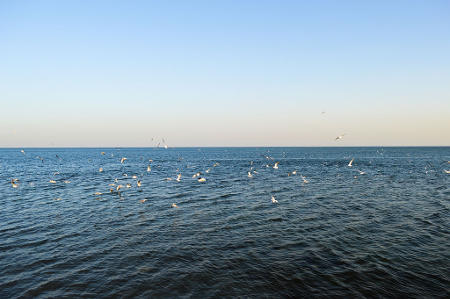Using AI to control energy for indoor agriculture
30 September 2024
Published online 13 January 2018
A new review highlights the impact of declining oxygen levels in the open ocean and coastal waters due to increasing temperatures and nutrient discharge.

© Francisco Anzola / CC BY 2.0
A new study1, published in Science, by a United Nations international working group, the Global Ocean Oxygen Network (GO2NE), is the first to assess of the causes, consequences, and solutions to deoxygenation, or the loss of oxygen, in open oceans and coastal waters. The research team includes Wajih Naqvi, who was affiliated, at the time of the study, with the Kuwait Institute for Scientific Research in Salmiya.
The authors cite greenhouse gas-driven global warming as the most likely cause of widespread deoxygenation in the open ocean.
The increase in ocean temperatures makes it more difficult for oxygen to reach deeper ocean layers. Naqvi says that this particularly affects areas like the Bay of Bengal, which has an existing naturally-caused oxygen deficiency. Further, in coastal areas, increasing runoff from sewage and fertilizer stimulates the growth of marine algae, leading to the excessive production of organic matter.
According to Naqvi, this has led to the development of more than 600 dead zones, areas that are hypoxic or devoid of adequate oxygen, along coasts all around the world.
The expansion of these dead zones shrink the habitat of oceanic organisms, impacting their survival, behaviour, and reproduction. This in turn has lowered the biodiversity and altered the structure of food webs in the oceans. It has also led to the increased production of nitrous oxide, which is a potent greenhouse gas, exacerbating global warming.
Matthew Long, a scientist affiliated with the National Centre for Atmospheric Research in Colorado, who was not a part of the study, says, “the changes in ocean oxygen that are underway now are following a pattern similar to [mass extinction] events in Earth's history. If action is not taken to mitigate climate change, the consequences for marine ecosystems are likely to be catastrophic.”
The study suggests that the impact of deoxygenation should be managed by better monitoring programs, which analyse widespread, real-time measurements over larger ocean areas. It is vital to educate people about curtailing greenhouse gas emissions, and better fertilizer, sewage, and waste management, according to Naqvi. He says, that in the Middle-East, in particular, “increasing discharges of sewage from the sprawling urban/industrial centres that are cropping up all along the shores of the Persian Gulf, have led to hypoxic conditions in the central Gulf, which were not observed previously.”
Long agrees, underscoring the importance of developing “effective social and political institutions to manage and reduce this impact.” He adds, “the most important thing people can do is to demand their elected officials take this issue seriously and pursue effective climate and environmental policy.”
doi:10.1038/nmiddleeast.2018.2
Stay connected: